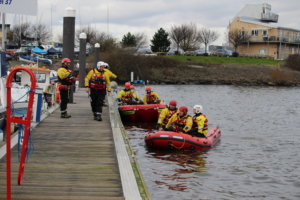Water Safety Wales Urges Members of the Public to ‘Respect the Water’ and ‘Stay Safe’
Water Safety Wales, which includes representatives from the emergency services, safety charities, water utilities, activity governing bodies and quarry operators is urging members of the public to stay safe around water. Water Safety Wales is concerned that the easing of the Government’s restrictions in relation to COVID-19 and the prolonged spell of warm weather may result in increased incidents of drownings or demands on the emergency services to assist in water related rescues.
With leisure centres and swimming pools still closed, open water such as, the sea, reservoirs, lakes, rivers, ponds and quarry lakes may seem a tempting alternative for a quick dip or water activities, particularly if they are located close to urban conurbations. Although these bodies of open water may seem alluring on a hot day, they will often conceal a range of hazards of which people will be unaware.
Even though the weather is warm, the water is still extremely cold, well below 15°C, the temperature at which ‘cold water shock’ can occur. This is an involuntary inhalation when exposed suddenly to cold water that can result in water being sucked into the lungs, this immediately puts an individual at risk of drowning. Cold water also significantly impairs one’s ability to swim, even strong swimmers can find that their muscles tire more rapidly and individuals can become disorientated. Anyone suffering cold water shock should resist the urge to panic, relax and float on their backs until the cold water shock passes and they can take a next step, whether that is calling for help or swimming to safety.
In addition to the water temperature, there are many other potential hazards such as strong currents, tidal changes, unexpected depth changes, concealed debris or vegetation that can injure or wrap around legs. In purpose made water such as reservoirs and quarry lakes there can also be pumps operating beneath the surface, as well as steep or crumbling sides that make exiting from the water difficult and the potential of pollution.
Anyone exercising outdoors near water at the coast or inland should be aware of their surroundings, be aware of tidal changes, adhere to safety signs and follow government guidance. Always carry a means of calling for help and dial 999 in an emergency.
Dave Ansell from the South Wales Fire and Rescue Service and the Chair of Water Safety Wales said
“Changes to Government guidance does not mean the risks at coastal and inland water locations disappear – the dangers that have always been there remain.
To avoid increasing the burden on the NHS we advise people not to take unnecessary risks while exercising and to only exercise locally.
We urge members of the public not to ignore warning signs that are there to protect them and to only enter water where they know it is safe to do so, with the correct training and equipment.
Should someone get into trouble, do not enter the water to try and rescue them, shout to them to reassure them and tell them to relax and float on their backs, throw them a flotation device or try to use something to reach them whilst you remain on land. Call 999 and ask for the Fire and Rescue Service if you are inland and the Coastguard at the coast.
“If you find yourself in difficulty in water, try and float on your back, this will allow yourself time to adjust and calm yourself, allowing time for help to arrive or for you to then self-rescue.”
 It is also important to note that at present there are no RNLI lifeguards on beaches in Wales. The RNLI is working hard to start a lifeguard service on several beaches in Wales but this will take a number of weeks. Parents are now being urged to take charge and be ‘beach smart’ if they visit the coast to ensure they and their families have the safest summer possible, whether lifeguards are patrolling their beach or not.
It is also important to note that at present there are no RNLI lifeguards on beaches in Wales. The RNLI is working hard to start a lifeguard service on several beaches in Wales but this will take a number of weeks. Parents are now being urged to take charge and be ‘beach smart’ if they visit the coast to ensure they and their families have the safest summer possible, whether lifeguards are patrolling their beach or not.
More information on water safety can be found on the websites of organisations such as the RNLI and RLSS.